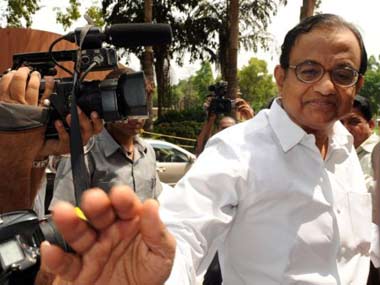P Chidamabram has struck the right chord with the markets in his first interaction with the media after assuming the finance portfolio. But talking up the market is one thing, walking the talk is another.
His Monday’s statements had scores of promises, few concrete steps. The only step announced was setting up of a panel (One more panel. Sigh!) to devise ways to get back to fiscal consolidation path.
On inflation, he merely said steps will be taken to address supply-side constraints. The promise of a rate cut was given, though he did not have a road map for fiscal consolidation, which is precondition put forward by the central bank for a rate cut.
[caption id=“attachment_408266” align=“alignleft” width=“380”]  The twin deficits are the biggest problem the economy. Reuters[/caption]
The twin deficits are the biggest problem the economy is facing, of which fiscal deficit is also a result of the government’s profligacy.
It should not be coincidental that the Finance Minister’s comments came on a day when Reserve Bank of India Governor D Subbarao told the Parliamentary Standing Committee that an increase in fuel prices will result in a 2.6 percent spike in inflation.
Considering that deft management of inflation is key to the survival of any political party at the helm, one need not look elsewhere for a reason for the lack of any concrete steps on fuel prices in Chidambaram’s statement.
With elections looming ahead, the government would want to refrain from taking unpopular decisions.
Already, the drought-like situation prevailing in most parts of the country is expected to result in an inflation spiral. The cut in fuel subsidy will add to the worry.
But what the government, and more importantly the political parties that oppose any increase in fuel prices, should keep in mind is that an upward revision in fuel prices will help the economy in the long term.
That is precisely why Subbarao has pitched for a more realistic 7 percent growth and 5 percent inflation to the standing committee.
Already, the fuel usage is skewed towards diesel, which is cheaper than decontrolled petrol.
A report in the Business Standard said a major part of the diesel subsidy dole is enjoyed by truckers and not farmers, its original intended beneficiaries.
While truckers’ shares in the subsidy is 38 percent, that of farmers is an abysmally low 12.8 percent, the report said.
It is once again wait and watch for the economy, as it is uncertain how much Chidambaram will be able to explain this simple math to his bosses, allies and the Opposition.


)
)
)
)
)
)
)
)
)



